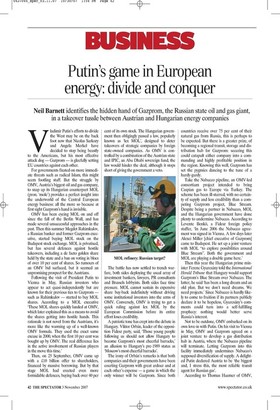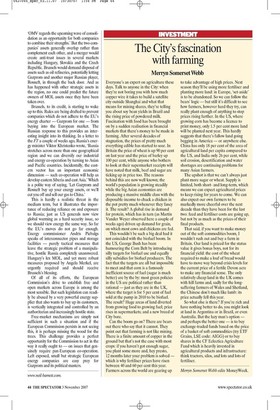Putin's game in European energy: divide and conquer
Neil Barnett identifies the hidden hand of Gazprom, the Russian state oil and gas giant, in a takeover tussle between Austrian and Hungarian energy companies vladimir Putin's efforts to divide the West may be on the back foot now that Nicolas Sarkozy and Angela Merkel have decided to stop being beastly to the Americans, but his most effective attack dog — Gazprom — is gleefully setting EU countries against each other.
For governments fixated on more immediate threats such as radical Islam, this might seem footling stuff. But the struggle by OMV, Austria's biggest oil and gas company, to snap up its Hungarian counterpart MOL (pron. 'mole') provides a perfect insight into the underworld of the Central European energy business: all the more so because at first sight Gazprom's hand is invisible.
OMV has been eyeing MOL on and off since the fall of the Berlin Wall, and has made several unsuccessful approaches in the past. Then this summer Megdet Rahimkulov, a Russian banker and former Gazprom executive, started buying MOL stock on the Budapest stock exchange. MOL is privatised, but has several defences against hostile takeovers, including a de facto golden share held by the state and a ban on voting in blocs of over 10 per cent of shares. So rumours of an OMV bid surfaced, but it seemed an unpromising prospect for the Austrians.
Following the visit of President Putin to Vienna in May, Russian investors who appear to act quasi-independently but are known for their previous ties to Gazprom — such as Rahimkulov — started to buy MOL shares. According to a MOL executive 'These MOL shares quickly landed at OMV, which later explained this as a means to avoid the shares getting into hostile hands. This rationale is not novel from the Austrians, it's more like the warming up of a well-known OMV formula. They used the exact same excuse in 2000, when the first 10 per cent was bought up by OMV. The real difference lies in the active involvement of Russian players in the move this time.'
Then, on 25 September, OMV came up with a £10 billion offer to shareholders, financed by massive borrowing. But by that stage MOL had erected even more formidable defences, buying back over 40 per cent of its own stock. The Hungarian government then obligingly passed a law, popularly known as 'lex MOL', designed to deter takeovers of strategic companies by foreign state-owned companies. As OMV is controlled by a combination of the Austrian state and IPIC, an Abu Dhabi sovereign fund, the law would hinder the deal, although it stops short of giving the government a veto.
The battle has now settled to trench warfare, both sides deploying the usual array of investment bankers, lawyers, PR consultants and Brussels lobbyists. Both sides face time pressure. MOL cannot sustain its expensive share buy-back indefinitely without driving some institutional investors into the arms of OMV. Conversely, OMV is trying to get a quick ruling against lex MOL by the European Commission before its entire effort loses credibility.
A patriotic tone has crept into the debate in Hungary. Viktor Orban, leader of the opposition Fidesz party, said, 'Those young people following us should not allow Hungary to become Gazprom's most cheerful barracks,' an allusion to Hungary's pre-1989 status as 'Moscow's most cheerful barracks'.
The irony of Orban's remarks is that both companies and their governments have been courting Gazprom with great ardour and at each other's expense — a game in which the only winner will be Gazprom. Since both countries receive over 75 per cent of their natural gas from Russia, this is perhaps to be expected. But there is a greater prize, of becoming a regional transit, storage and distribution hub for Gazprom: securing this could catapult either company into a commanding and highly profitable position in the region. Knowing this well, Gazprom has set the pygmies dancing to the tune of a hurdy-gurdy.
Take the Nabucco pipeline, an OMV-led consortium project intended to bring Caspian gas to Europe via Turkey. The scheme has been ill-starred, with no certainty of supply and less credibility than a competing Gazprom project, Blue Stream. Despite being a partner in Nabucco, MOL and the Hungarian government have done plenty to undermine Nabucco. According to Levente Benko, a Fidesz foreign policy staffer, 'In June 2006 the Nabucco agreement was signed in Vienna. A few days later Alexei Miller [chief executive of Gazprom] came to Budapest. He set up a joint venture with MOL "to explore possibilities around Blue Stream". Both the government and MOL are playing a double game here.'
Then this year the Hungarian prime minister Ferenc Gyurcsany told the International Herald Tribune that Hungary would support Gazprom's Blue Stream over Nabucco. The latter, he said 'has been a long dream and an old plan. But we don't need dreams. We need projects.' Since Nabucco is hardly likely to come to fruition if its partners publicly declare it to be hopeless, Gyurcsany's comments could turn into a self-fulfilling prophecy: nothing would better serve Russia's interest.
Not to be outdone, OMV embarked on its own love-in with Putin. On his visit to Vienna in May, OMV and Gazprom agreed on a joint venture to develop a gas distribution hub in Austria, where the Nabucco pipeline will terminate. Letting Gazprom into this facility immediately undermines Nabucco's supposed diversification of supply. A delighted Putin declared Austria to be `the biggest and, I stress this, the most reliable transit agent for Russian gas'.
According to Thomas Huemer of OMV, `OMV regards the upcoming wave of consolidation as an opportunity for both companies to combine their strengths.' But the two companies' assets generally overlap rather than complement each other, and a merger would create anti-trust issues in several markets including Hungary, Slovakia and the Czech Republic. Brussels would demand disposal of assets such as oil refineries, potentially letting Gazprom and another major Russian player, Rosneft, in through the back door. And as has happened with other strategic assets in the region, no one could predict the future owners of MOL assets once they have been taken over.
Brussels, to its credit, is starting to wake up to this. Rules are being drafted to prevent companies which do not adhere to the EU's energy charter — Gazprom for one — from buying into the European market. The Russian response to this provides an interesting insight into its thinking. In a letter to the FT a couple of weeks ago, Russia's energy minister Viktor Khristenko wrote, 'Russia stretches across more than one geographical region and we can diversify our industrial and energy co-operation by turning to Asian and Pacific countries. Incidentally, the eastern vector has an important economic dimension — such co-operation will help us develop eastern Siberia and east Asia.' Which is a polite way of saying, 'Let Gazprom and Rosneft buy up your energy assets, or we'll cut you off and sell our gas to China.'
This is hardly a realistic threat in the medium term, but it illustrates the importance of reducing reliance on and exposure to Russia; just as US generals now view global warming as a hard security issue, so we should view energy the same way. So far the EU's moves do not go far enough. Energy commissioner Andris Piebalgs speaks of interconnector pipes and storage facilities — purely tactical measures that leave the strategic problem of a manipulative, hostile Russia completely unanswered. Hungary's lex MOL, and yet more robust measures proposed by Angela Merkel, are urgently required and should receive Brussels's blessing.
Of all of its efforts, the European Commission's drive to establish free and open markets across Europe is among the most sensible. But such legislation can readily be abused by a very powerful energy supplier that also wants to buy up its customers, is vertically integrated and controlled by an authoritarian and increasingly hostile state.
Free-market mechanisms are simply not sufficient in such a situation and if the European Commission persists in not seeing this, it is perhaps missing the wood for the trees. This challenge provides a perfect opportunity for the Commission to act in the way it really ought to — on issues that genuinely require pan-European co-operation. Left exposed, small but strategic European energy companies are easy prey for Gazprom and its political masters.
www.neibbamett.corn.













































































 Previous page
Previous page